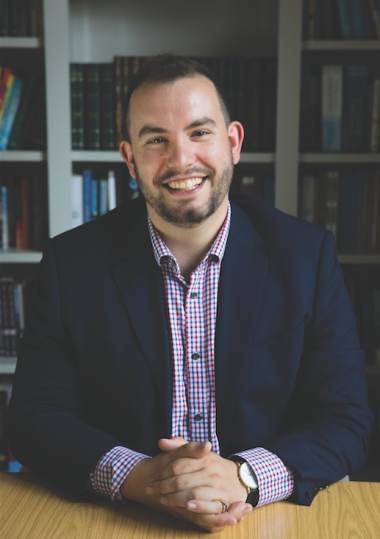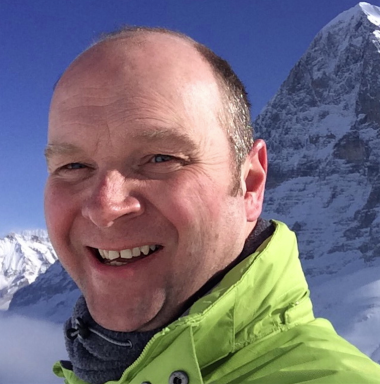The church and sexuality: 2 Oxford evangelical views
These articles appear in Pathways, the new magazine for people in the Diocese of Oxford. The theme for the current issue, out this week, follows a recent letter to clergy from the bishops, which offered reflections on current debates in the area of human sexuality.
David Bennett is pursuing a DPhil (PhD) in theology and is a fellow at the Oxford Centre for Christian Apologetics.

Coming out at as gay at 14 meant the church wasn't a safe space for me.
I had relatives with strong views who would say things that were disparaging and even homophobic. 'You have to be this to be accepted and loved by God,' I thought, 'I'm in this category so I hate this religion because it deletes me from existence.
As I kissed a boyfriend in a park a man pulled up on a motorbike, raised the visor on his helmet, picked up a large stone and threw it onto my back. I remember this rage within me, at how such hatred could exist. I connected my experience of Christianity with that act of violence. Christianity became the thing that was in the way of the liberation of LGBTQI people.
But there was a vacuum in my life. The secular ideal of romantic love cracked in my mind. I had that Solomonic moment and knew that the desire I had for love indicated that I was made for something higher. Later, my uncle confronted my easy relativism. He didn't tell me, but he had a word that I would meet Jesus in three months.
He was right. Three months later I saw a film maker I wanted to interview for the student publication. I said, 'What inspired you?' and she said, 'God' – to which my face scrunched up. She offered me prayer. As she prayed, I felt tingling on the top of my head. It was as if someone was pouring a vial of oil over me. I heard a voice in my mind: 'Will you accept my Son Jesus as your Lord and Saviour?' I felt this tug of war over my soul for about five minutes. Finally I said 'Yes' and that was when the love of God was poured out through me. I was weeping healing tears.
It's been a long journey reconciling my faith and sexuality.
I had to become poor sexually to inherit the kingdom of God. I believe scripture lands on the side of the orthodox traditional perspective. But that doesn't transform people. For me it was getting the law to be written on my heart – not just understanding the law in my mind. And that was a long process as I gave my sexuality to God.
I am so grateful that my church didn't change its theology but offered me love and the freedom to hear from God in scripture. Jesus lived without sex and he was the greatest example of human flourishing.
God loves gay people, he loves the LGBTI+ community. I feel called to be someone who articulates and proclaims that. If you are gay, that cannot separate you from the love of God.
Living obediently will bring an incredible glory to Jesus. God won't put a burden on you that's too heavy to carry. God's love is unconditional. It is God's voice and opinion that matters as known in God's Word and Spirit, not human beings.
Rev Marcus Green writes as an evangelical who questions the traditionalist approach to the Church's sexuality debates.

I can remember exactly where I was the day I realised I needed a new theology.
A friend in Memphis does work in civil rights theology. He teaches me that when you are an oppressed minority and become aware of it, Jesus is dynamite. Every word Jesus speaks is explosive because it's about you. It doesn't matter if it's about lepers or tax collectors or Canaanite women – it's about you. You hear a gospel of life and hope and freedom, and it is God's promise for you.
This became real for me on a miserable Tuesday afternoon one February in my early 40s. I suddenly understood I had spent 30 years accepting that as a gay man I was in fact a broken straight man. Every traditionalist word spoken from every pew and every pulpit in every evangelical church I'd ever belonged to had sunk deep into my soul. They had convinced me that being gay meant I was in fact a second-class human being. This is a terrible lie. It's shocking theology. It's appalling Bible interpretation. It was cold outside, but that day the truth was already starting to set me free. As the song says, I'm only human: but guess what? God doesn't create rejects.
I'm going to repeat myself.
God doesn't create rejects. Seconds. Spoiled copies. Sure, we all have treasure in jars of clay, but no one who calls Jesus 'Lord' sits in the cheap seats in the Kingdom of God.
And I knew I had work to do, because in my head was a whole Bible shouting at me about how much God loves every single person. I had believed pharisees who use the Scripture to tie up the broken hearted, when instead I needed to hear the Saviour who proclaims release for the captive. Every time in the Bible when Jesus encounters some poor soul, ground into the dirt by another 'kind' religious person, that poor soul is raised up on high.
And Jesus does it for us, too. When I thought I was a broken straight person, life could be unbearable and heavy and would break me further. There are still travails and burdens – but now I know that I too am fearfully and wonderfully made, called by name, loved. Gay people do not need to pretend to be straight/appear to be straight/not seem to be gay in order to fit into God's Kingdom order. Just because the foot isn't a hand doesn't mean it doesn't belong to the body – that's ridiculous!
We are all gloriously equal in Jesus' family.
Here's the lesson from civil rights theology: Why are the texts everyone else takes for granted not about us too? Why is this freedom and life and Good News not for us? Why do these stories only give full hope to other people?
Because if I too am only human, then Jesus died for me. And that is more than enough. No-one should call unclean what God has called 'beloved'.
Marcus Green and David Bennett have each published books on this topic in recent months:
'The Possibility of Difference' by Marcus Green, published by Kevin Mayhew, and 'A War of Loves' by David Bennett, published by HarperCollins.











